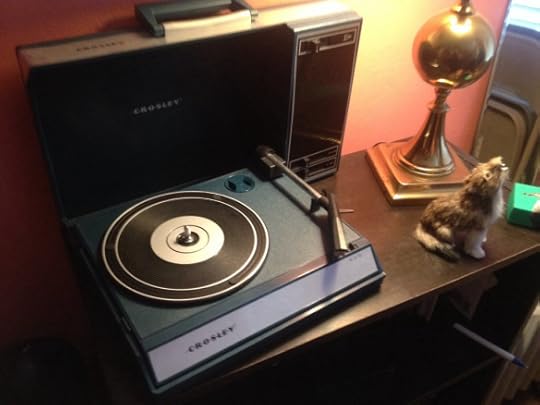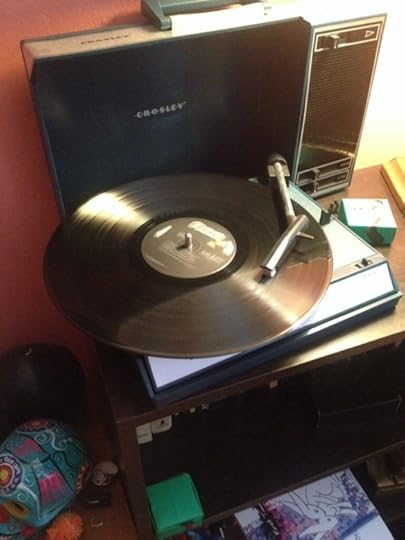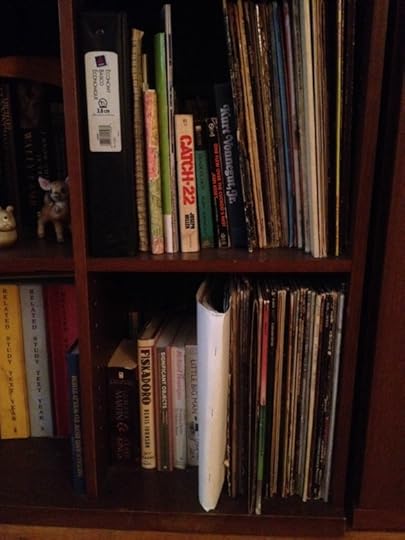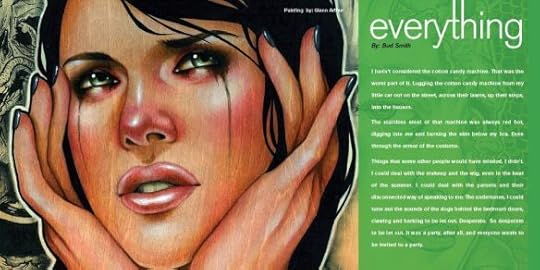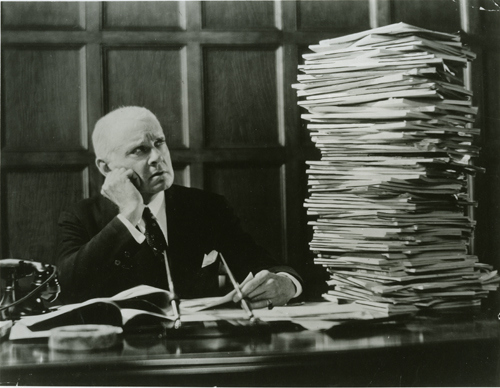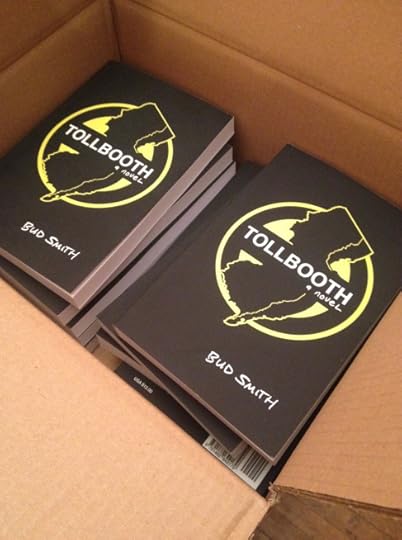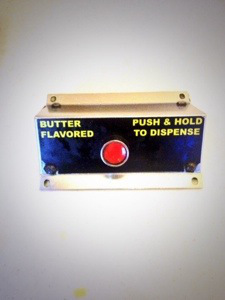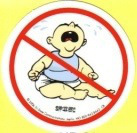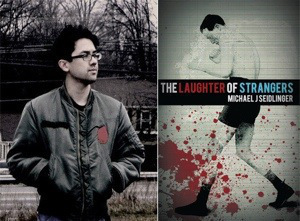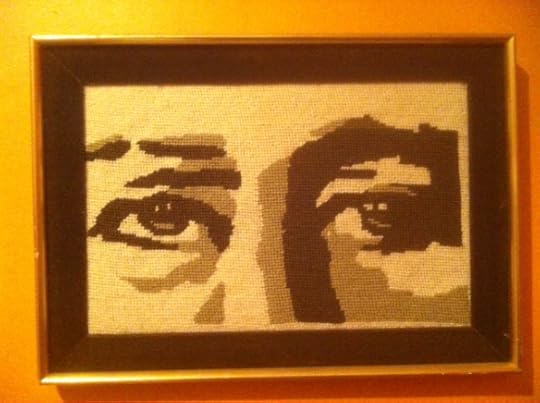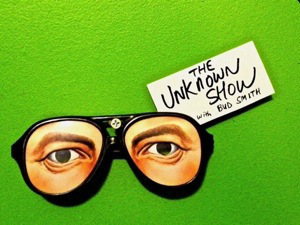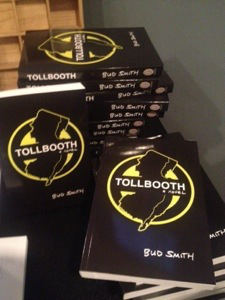Bud Smith's Blog: Bud Smith , page 23
February 2, 2014
Why I Like My Record Player
All morning I’ve been sitting here listening to the Rolling Stones album, Let it Bleed. I mean, I’ve been doing other things besides just sitting here. Mostly, writing stuff: an article a website wanted on what creative non-fiction is, and a couple poems I’m finishing up for my collection Everything Neon. But I haven’t gotten very far away from my desk. And that’s because of two things, a) it’s snowing like a mofo outside, and b) I love my desk, and the things within arm’s reach of it.
A quick note on the desk: It came from the trash in 2006. It’s made out of the cheapest particle board junk. It’s nothing fancy at all, it’s warped and all nicked up from a billion coffee cup spills. The best thing about my desk? Without stretching I can reach my record player.
I could sit here forever, and maybe I will sit here forever. When You Can’t Always Get What You Want ends and side A of Let it Bleed stops spinning, I just reach over and flip it to side B, and Midnight Rambler comes on. There’s something perfect for me about vinyl records, this shitty desk, this cup of coffee, it all adds up so nicely.
Why vinyl records? Here’s why:
1. The sides are quick, twenty minutes or so.
A) when the record stops, I can start it again back at the beginning and re-listen to that 20 minute chunk again.
B) I like the meditative qualities of that. After listening to the same side of a record long enough, I feel lost in it.
C) It was very important as a recording artist how you opened and closed each side of the record. The sequencing of the tracks made a huge difference. That was lost once CDs became the norm.
2. I like the way records sound. A record sounds the same way that snow looks when it falls. And sound the same way jumping into a like off a tire swing feels.
3. I can hunt out cheap vinyls for a dollar or two at flea markets or on the sidewalks of New York City.
4. Digital music is fine, but I like the limitations of vinyl.
A) An album/a record used to be put together with as much care a novel. Think circa 1967-1984 thereabouts.
B) The 40 minute mark for me is enough
C) I don’t want an infinite playlist. I want an artists attempt at ‘assembling a finite track listing that reflects exactly where they are, in that exact year.’ No better example of this done well than Pink Floyd’s Dark Side of the Moon.
5. I like the stack of them, and the way they look under the bookcase (which is also of course within arms reach. Gotta keep the bookcase close to the desk.)
A) The album artwork used to be so beautiful.
B) It was a tangible object. I like tangible objects. I don’t like the idea of paperback books floating in a cloud. I don’t like the idea of a vinyl floating in a cloud either.
C) I can flip through them when Let It Bleed ends for the tenth time and I can say, “Ah, I feel like putting Nilsson Schmilsson on, or I feel like putting David Bowie Low on, and really mean it. Physcially take the thing out of the paper sleeve, set it on the turn table, drop the needle. I get simple joy out of that. We exist in a digital world, but every time I can ‘not click on something’ I’m going for it.
About the record player:
It was cheap. I got it as a gift from my sister in California. She paid about $75 for it. It’s a Crosley suitcase travel record player. Green. It has a side speaker that came built into the thing. You cannot upgrade the speaker. You cannot plug fancy-ass Bose speakers into it to make the sound rich and beautiful. It is what it is. And that’s what I love most about it.
Everyday for the last year, I’ve sat at this desk and written for at least half an hour and I’ve done it with that record player spinning, wobbling, hissing and popping.
I’m reminded of being a teenager again. I’ve fallen in love deeply with music again. It’s always been there, I’ve always been a fan and have always had a very large collection of music. But there’s something different now. It’s attached itself in a way to my writing. This space that I’ve created here, this desk—bookcases flanking it on both sides: a 1/2 size bookcase to my immediate right with the record table on top next to my bronze golden eagle lamp, countless books stuffed and piled underneath on the shelves, the bottom shelf reserved for about 100 of my favorite records … this is a nice spot to work.
There’s a chair facing perpendicular to the desk where Spout comes in and sits with me, we drink coffee or beer and talk, and play records real low. The radiator is next to the chair, so we’re always warm sitting here on snowy days like today, and in the summer this room is cool enough that we can just open up the window that lets out onto the fire escape and things are nice.
The records bleed into the writing too. I’m working on a novella about a boy and girl who get caught up in a cross-country spree killing. I’m wrapping up a book called Teenager, and beginning to send it around to see if some presses are interested in it. A big influence on the book is the movie Badlands, but just as importantly, the album Bat Out of Hell by Meatloaf and the Bruce Springsteen record Nebraska.
I’m interested in simple repetition and how that translates, day in and day out to become art. There’s no three things I know that are better joined than this desk, this record player and this writing.
Almost time for a new needle.

February 1, 2014
Everything
I hadn’t considered the cotton candy machine. That was the worst part of being a clown—lugging the machine from my car, across their lawns, up their steps, into the houses. Its stainless steel was always red hot, burning the skin below my bra, even through the armor of the costume.
Things that some other people would have minded, I didn’t. I could deal with the makeup and the wig, even in the heat of the summer. I could deal with the parents and their disconnected way of speaking to me—the undertones. I could tune out the sounds of the dogs behind the bedroom doors, clawing and barking, desperate to be let out. It was a party, after all, and everyone wants to be invited to a party.
My true fear was the children. Would I be able to face them again after what happened in Wooster? Could I deal with all those screaming, over-eager children? It turned out, that part was easy. All I had to do was plug in the cotton candy machine, dump in the sugar and the water—let it all whir to life. I’d make them all some cotton candy, and they were mine then, and would do whatever I wanted.
After just an hour of kiddie entertainment, I was free to go, fifty dollars in my pocket. Then it was just the struggle with the machine down the steps, across the lawn, through the sprinklers. The dogs would bark again from the windows, venetian blinds made crooked, nearly ripped down by paws and gnashing teeth. The dogs are always so frantic to get at you.
They’re not the only ones.
The children don’t ever think to wave goodbye. They are busy with the birthday cake. It’s timed that way.
Then, clown: take the wig off in the car. Wipe the makeup away. Remove the rainbow striped costume in the back seat. Reveal your true identity layer by layer, however flawed it is. Pink skin. Sweat. A young body like a piece of music that no one notices just yet. Maybe by the time you die they will appreciate it. Sing along, buddy. Sing along. Looking out the windows to see if the coasts clear, no leering lawn boys or ice cream truck men—quick, change into your little bikini, neon tetra, neon tetra, steam up the windows. Tune the radio. Start the car if you can. Meet your girlfriends at the beach.
Whatever lingering traces of the face paint remain around the edges of the eyelid and/or corners of the mouth, the ocean will wash from you.
That is love.
My father caught me coming down the stairs from my room. Touched my arm. This was serious.
“Sweetie, I want to talk to you.”
“What, dad?”
“I just wanted to say that I’m a little worried about something…” He was trying to be delicate with his wording. Things had been at an impasse between us since his high school cheerleader came back an art school weirdo.
“Go ahead,” I said, worrying it’d be about getting a AIDS test.
Instead, my dad says, “Ya know, just a warning. Clowns usually wind up becoming alcoholics.”
“Oh.”
“Okay, so just—please watch your drinking.”
“Thanks.” It’s awkward. He stands there looking at me, not sure who I am. I don’t know how to ease his worry about me. His hair is thin and grey. He’s shrunk 3/4 of an inch. I don’t wear earrings anymore, they’re at the bottom of some fountain. What happens is, everyone gets averaged out to a least common denominator by anyone who is even aware you exist. I am worried about being boring. I am worried about being reduced to something simpler than I could really be. He touches my wrist and I feel fine suddenly.
“I’m going for bagels,” dad says, Would you like an everything?”
“Everything,” I say.
The service sent me out as Cinderella, which was better. I didn’t have to drag around heavy props. I could dust on a regular dosage of human-flavored makeup. I got to wear a big wig, which is always something I like. My hair is thin, I hate it. I like having a big head. Add some fake eyelashes, a long beautiful gold gown and some clear plastic slippers, and I couldn’t be ‘work’ happier.
The crux was that I had to park the car a few blocks away and walk through the neighborhood in my gown, creating an illusion for the kids. Cinderella wouldn’t drive a brown Dodge Omni in real life, would she?
People walking their dogs would bust out laughing. Boys in loud import cars idling up next to me, tell me they want to show me their pumpkin. Even the mailman had some commentary, “I Like your costume.”
“I like yours too,” I say, eyes on fire till he looks down at his mailman shoes.
The party was tame. Little girls, all happy to see me. We drank fruit punch, pretending it was tea. They were asking tons of questions about Prince Charming. How many ponies did I own? Could I fly? Did I personally know Alice? Was I close friends with Snow White? Of course I know her, she’s my best friend. Were her dwarves as short in real life? Shorter. Snow White herself is a dwarf. The dwarves are just slightly bigger than microscopic.
After the party, the mother and father herd me into the guest room. They had a few points they wanted to discuss before they paid me and released me back into the wild.
“You were really good,” the mother said. “You’re a natural. How old are you?”
“19.”
“Perfect. This a summer job for college?”
“Yeah.”
“I want to give you our card. We have our own business.”
She handed me a red card that said, TEMPTATIONS.
“We’re always looking for girls with as much talent as you,” the father said, stroking his beard.
“You have such a nice figure. Your tits are great. They are such great tits. Have you ever considered stripping?” the mother asked.
“No,” I said.
“You should. I can tell you have great legs even with that gown.”
“Call us. You’ll love the money,” he said.
Then, I walked down the street, the sun reflecting off of my dress and tiara and my long white gloves. I was lit up, impossibly bright and couldn’t stay out of sight, though I tried, believe me. My car was only a few blocks away, it felt like a thousand miles. There are no shadows that time of day. Everything is obvious, everything exposed.
I could have stayed in Wooster. Things hadn’t worked out. My friend hooked me up with a job at the daycare center where she worked.
The kids were psycho, possessing kinetic energy than I can explain. They ripped at my blouse, pulled my hair, flung things at me. I remember, helping a boy put blocks away and while I was bent over one of them jumped on my back. Wild. Feral. A Little whirlwind I could not contain. I tried to get him off me but he wouldn’t let go. Then, the teeth sunk in, piercing me so hard, drawing blood.
I quit that job on the spot. Stop on a dime.
That night, I stood in the bathroom, looking at my wound in a mirror reflected in a mirror, my blouse crumbled on the tile floor. My shoulder was so swollen I couldn’t wear my bra. I felt the puffy flesh, throbbing, pulsing, amplified a hundred times over.
When I went to the doctor, he wouldn’t give me tetanus shots or rabies shots for it. He thought it was funny I would ask. “Kids don’t have rabies …”
I disagreed.
As I drove south, my little car shaking on the highway at moderately high speeds, I felt worthless having to admit defeat and return to live in my parents house, facing the silent wrath of their non-judgement.
I was in a cowboy suit. A massive helmet obscuring my entire head, a wide brimmed hat affixed to the top. I could see out of two small holes. It was hot and my breath in the cowboy head bounced back like a furnace. I slowly waved at the cars passing on the road driving towards the beach. Behind me was a pharmacy that had a little window that sold ice cream cones.
I waved anonymously. I could have been anyone. At one point, I saw Jesse and Callie drive by in the convertible. They were on their way to the water. I very much wanted to be with them. I waved. They waved back. They had no idea that it was me. I could have been anyone.
A gang of little boys rolled up on BMXs.
“Look at this loser!” one kid yelled.
I just waved. They had a plan for me.
The next thing I know, I’m getting pushed around. They’re knocking into me with their bikes, kicking me in the legs. shoving me. I collapse onto the asphalt. I’m punched in the stomach, hard. I feel the giant cowboy helmet jarring to the side. I yell at them to stop, they don’t. They just kept beating on me. They are frothing at the mouth in violent excitement. Kick after kick gets buried deep in my stomach. They stomp my neck, my hands—but the cowboy head is ripped off.
Cool air and sunlight rush in. They gasp in surprise.
“IT’S A GIRL!”
Theyfling the cowboy helemt out into traffic, then flee on their BMXs. Hurt, I lay there, lightly sobbing, dizzy and shocked. When I finally get up and drag myself to the window, the ice cream girl doesn’t say anything. She just looks at me like, so? She points at my cowboy head in the middle of the road.
A truck had run it over, crushing it and splitting it apart all at the same time.
I sat alone at the kitchen table. I took the red business card out of my purse. For a long time, I studied the card, also listening to the air conditioner, the sprinklers out in the yard, a bird in a tree. Wooooooo. Woooooooo. I looked down at my breasts that were almost resting on the table. I felt my legs under the table. I could be very good. I had the right body. I liked to entertain children. Men were like children. Weren’t they?
I folded the card in half, tucking it back in my purse. I opened the newspaper and looked through the Help Wanted Section instead. Cashier. Clerk. Wild bird seed saleswoman. Newspaper delivery. Anything else.
The service was making me pay for the cowboy head. The joke was on them though, I still their had the cotton candy machine in the trunk of my car. They had no idea, but I didn’t make any more cotton candy. Fried Paradise eventually took me in. I worked the register and made french fries, shrimp baskets, drumsticks, thighs, breasts, wings.
When I sold the cotton candy machine in the fall, it urned out to be enough money for two books that I needed that semester.

January 30, 2014
Tollbooth Chapter 27-28
*** continuing the serialization of Tollbooth***
click here to start at the beginning
142A
Ted knew a spot for our hideout, “It’s down towards the river,” he said. “Sometimes I walk Rommel there. It’s down a secluded hidden trail just wide enough to fit your car.”
He seemed totally numb to the whole idea. While, I parked the Subaru in an area of unknown beauty—the dark woods behind the neighborhood. There, I could hear the cars on the highway, and somehow still see the river.
“It’s nice out here,” he said. “Maybe your idea isn’t so bad.”
Slowly, I looked up at the trees and down towards the river. What a place to hide away. I began to rip off the duct tape, pulling the boards down from their resting place. “We’ll get this all hooked up and then you’ll have a place to come and hang out, get away from our wives.”
“We built clubhouses when I was a kid,” Ted said, kicking a pinecone into the woods, “It might be a lot of fun.”
By the time the sun was falling we had what resembled a shack leaning against the space between two trees. We stood back, expecting the whole thing to collapse. We’d set all of the plywood walls, cut an opening for our front door. All it would take was another day or so to hang the door and the window, and then a little time to do the roof, I picked up a large rock and smashed it against the closest wall, a massive echo shot thorough the woods, “I can’t believe it didn’t fall down!”
“I have clubhouse experience! I’ve done this before,” Ted said.
“And I’m totally proud of you!” It was my first clubhouse. My dad hadn’t been the kind of guy that actually did things with his kid. I was more proud of the fort than my own home.
“OK, this whole thing has been tons of fun, but I have to go, Kelly will have dinner ready soon.”
“I’m staying here tonight,” I said.
“Here?”
“Yeah,” I said, “I have a sleeping bag and everything.”
“Why?”
“Because I want to. Plus, I’m fighting with Sarah.”
“ . . . If you need somewhere to crash.”
“No, I don’t need somewhere to crash.”
“Well, that’s fucked up.”
“You’re wife doesn’t want a guest anyway.”
“ . . . You’re probably right,” he admitted. “Go home, it can’t be that bad.”
“Sound advice.”
He began to walk back up the path to where his minivan was parked, “Call me tomorrow, maybe you and Sarah can come over and watch a DVD with me and Kelly.”
“Sounds good.”
All I could think was: is Ted completely out of his mind? Doesn’t he know that no matter what, I’d be there after work, finishing the roof of our fortress?
141
Again, I didn’t go to work. All day, I labored on the construction of my fortress.
When I was finished, I couldn’t believe my eyes. What a wonderful place. I decided it was a better home than the where my wife and I lived. So, hey why not move out into the woods with the other stupid animals?
I’d live in a shack by the river with the sounds of the dinosaurs on the highway, and only half a mile from the toll plaza, I would be two miles closer to work. That meant four miles a day saved in gas, twenty eight miles a week. Surely that was enough money saved for what I would have to pay my wife in alimony. Because it was obvious to me that first night that I slept there, that I had to make this change. The air of the woods made me feel like I was nine years old again, on a Cub Scout camp out, even though I was never a scout, something else my father forbade.
But the fact remained that I needed my clothes, and oh, oh yeah, my savings account passbook. A million other things too. My international passport just in case.
As much as I wanted to cut all connections off from my wife, I had to go home and I had to see her. I knew that she would be there, just sitting at the kitchen table, waiting.
I opened the door, the telephone was ringing, as if it knew I was coming and it had to react quickly in order to interrupt some murder scene between me and my wife.
For sure Sarah wanted to kill me.
I went into the kitchen. She waited like a lioness, staring at me. Behind her, our phone tolled out its belled doom. “Answer that,” I commanded. She tore it off the hook, “Hello,” she said agitated. Then, cupping the receiver with her hand, she scowled at me. “It’s some girl. Some young girl. Some young girl asking for you.”
“Huh?”
I snatched the phone from her, “Hello?”
“Jim? It’s Gena from Officetown.”
“Oh, hey. How are you?”
I cupped the phone, looking at my wife, “It’s nothing, no one.” She looked pissed. She had every right to be.
“Jim, you there?” Gena asked.
“Yeah.”
“Um, I was just calling to tell you that your order’s in. You can come and pick it up if you want, I mean, of course you want it, I mean, you should, like come now, and like get it.”
“Oh great.” get it? get it? get it?
“Have a nice night.” get it? get it? get it?
“OK, you too.” I hung up the phone. get it? get it?
“Who was that? She sounded nice?” Sarah mocked.
Suddenly all the bravery I had before entering my house had vanished. It was just like old times, the thought of leaving Sarah was like some myth that had been whispered over the years but couldn’t become truth.
“Where were you?” she hissed.
Thinking quick, “At Ted’s. I got drunk.”
“Me too,” she said, “got drunk, anyway.”
“Yeah, I bet.”
“How could you do that, just not come home?”
“I don’t know.”
“And then this call, from this girl?”
“That girl . . .”
“Who is she?”
“She’s just some fat ass who works at the office supply store.”
“Officetown?”
“I think that’s what that place is called.” She studied me for a moment and I felt like screaming. Where had the certainty gone? Was I leaving my wife and moving into the shack in the middle of the woods? The idea had vanished into the wind. It would be impossible for me to live out there, with no electricity, no running water and no . . . and holy shit, I’m so helpless.
“Ted is having some real big problems with his wife.”
“Like you?”
“Not quite, she left home. She’s going to divorce him.”
“Oh I have an idea of why a girl would want to leave her husband . . .”
“You see, their marriage isn’t as strong as ours.”
“Is he alright?” She was turning. Falling.
“No, not at all, I think he might be suicidal.”
“Suicidal?” Sarah looked at the floor. “Oh my god.”
“Yeah, I came home to get some things and to apologize for disappearing on you, but it’s just that my oldest friend in my life is going through hell.”
“Well . . .”
“Well, are you going to be all right here tonight by yourself.”
I sat closer to her, she studied me, studied, and I didn’t know I had it in me to be such an actor. I let her study me.
“You should go to your friend, I’ll be fine,” she said softly.
“You don’t mind?”
“Friends are important.”
“Yes they are, and you are my best friend, you know that right?” Really, she still was.
“Well I have had my doubts lately,” Sarah said.
“Don’t be cold to me, baby.”
We hugged. She started to cry, so emotional these days.
“Teddie needs to get real fucking drunk, talk about old times, the usual, get it all out.”
“OK.”
“I’m gonna get some things together.”
“OK.” I started up the stairs, “Do you want coffee?”
“Yeah, I’ll put it on,” my Sarah said.
I grabbed a few shirts, a few pairs of pants. I freaked out when I couldn’t find my bank book. I realized that I was in the middle of a mental breakdown with nothing to do but run with it. When I came back down the stairs she was putting the coffee grinds into the filter.
“What did you order from that store?”
“Nothing.”
“You ordered nothing?”
“Larry had me order some supplies for the office and they came in.”
“You do things in the office now?”
“Well I do have a baby on the way. Gotta try to climb the ladder. That booth sucks.”
“That’s great, that you want to better yourself.”
“Us,” I said, “it’s for us.”
“Do you want dinner?” she was almost smiling then.
“Look, I don’t really have time, I’m really worried about Teddie. I should go.”
I went to her, kissed her lips.
“Tell him that if he needs someone else to talk to he can always call here.”
“He knows that.”
Casually I walked to the car, casually placed my clothes inside. Casually started it. Sarah stood on the porch, loving me, waving goodbye while the bugs of the night were singing their song. I casually lowered my window, casually waved to my wife, she blew me a kiss, I caught it, brought it to my chest—a prized possession from a prize of a woman. She practically melted right there on the front porch.
I backed out of our driveway.
When I was far enough away from the house I stomped on the pedal like the true werewolf I was and I made my way madman style toward my own fury. She went back to the table and believed that our love was stronger than anything, and that only good things were coming.

January 28, 2014
GOT PAPERBACKS ON HAND AGAIN!
Just got a new shipment of my novel Tollbooth from the publisher, Piscataway House. Happy to have some copies back on hand! I’ve been signing them and mailing them out of my apartment with some copies of lit mags that have been donated by The Idiom and others. I’d love to mail you a book.
It’s $10.00
follow the paypal link below.
Shipping to USA only
Synopsis: Jimmy Saare collects tolls on the New Jersey Parkway. He’s had a mental snap, as a result, is becoming uncontrollably fixated with the 19 year old Gena who works the copy machine at Officetown. Despite his wife Sarah’s impending pregnancy, Jimmy pursues his desire for Gena, unexpectedly becoming more entangled with the strange manipulations of an anarchistic teenager, Kid with Clownhead, who wants to start his own destructive cult when he grows up.
Here’s some
hype:
“The mark of a genius rests in Smith’s writing, as he is able to meld Jimmy’s mundane life, his dreams of escape, his most crazed moments where the reader wants to slap him. —Jmww“
“Absolutely mad in the best way” James Duncan, Writer’s Digest
“A tantalizing joyride of contemporary American dysfunction …” - Zygote in My Coffee
“I highly recommend this one.” Metazen
“Bud Smith’s Tollbooth is like the car accident of a book that everyone slows down for, to watch along their way to wherever–the type of car accident that creates a 30 mile stretch of idling vehicles.” Aaron Dietz, author of Super
“Because of his strange unconventional (yet truthful) characters, Bud Smith’s odd landscape of stories are, more often than not, the most disarming of any around.”– Stephanie Bryant Anderson, Up the Staircase
It’s on Amazon and
It’s on Kindle too
also available on Kindle for $2.99
thanks for reading! Review copies are on hand too, if you’re a writer interested in doing a review of the book. Thanks.

BEWARE: Creative Writing Tips Ahead
I’m not much of a ‘taking advice’ guy (but I’m trying Ringo, I’m trying real hard.) And also: YOU SHOULDNT TAKE ADVICE FROM ME. I thought I’d write a little about some of things that I do with writing, as an effort to keep things moving. (As if the internet didn’t give you enough questionably fucked up advice.)
2013 was a really productive year for me, with the publication of Tollbooth, writing a novel called F-250, and a poetry collection Everything Neon (both titles coming soon). 2014 is looking good too.
Here’s a bunch of ignorable tips. Some may actually do more good than harm. But, hey, what the fuck, you gotta listen to some idiot, why not me?
Make more time for whatever creative project you’ve got going
a) I write on my lunch and coffee breaks at work. Sometimes this involves pushing ear plugs in extra deep because I work in an industrial hellhole.
b) the end of the work day, I generally sit at my ‘desk’ for an extra twenty minutes rather than fight the traffic out of the parking lot (200 people all leave at the same time.)
Clearing out space consistently day in day out for twenty minutes of writing/creative work is where the good stuff happens.
c) me and my wife got rid of our TV a couple years ago. Now we talk more, read more and make more art. We still sit and drink on the same couch, now we just do it with the radio on instead of junk TV. Helped immensely with creative output.
d) Saturday and Sunday morning, I wake up a little early and work on a writing project for a little bit before waking my wife up. I put a record on. I drink a couple cups of coffee. It’s nice. Try it.
Commit to write everyday. Even if it’s just 300 words.
a) that’ll take you about 20 minutes. Anybody has twenty minutes.
b) if you don’t have 20 minutes, quit something else that sucks.
c) I suggest quitting anything that involves things like: mowing your lawn, painting the exterior of stuff, raking leaves, wrapping gifts.
d) can’t commit to 20 minutes? Fuck it. Do 5.
e) can’t commit to 300 words. Okay, write ONE word a day. ONE FUCKING WORD. That’ll take 10 seconds. Commit to that. By the end of your life, you’ll probably have a good book done. (Studies show I’m full of shit.)
Get a critique partner/partners
a) having your work proofread helps you.
b) proofreading others work also helps you.
c) you can learn a lot from someone better than you.
d) you can learn just as much from someone who isn’t as far along as you. Don’t shy away from helping someone out, being a mentor. It’ll surprise you how much you can learn about your own work by helping someone else with theirs.
Attend a reading, meet other writers in person.
a) if you listen to non-professional writers read their work aloud, a few things become aparent. Particularly, the way language comes across.
b) if you read your work aloud, you’ll have the benefit of getting a reaction or non-reaction from the audience. It’s always possible to do a rewrite from the things you’ll learn.
c) a lot of them read in funny squeaky voices. That’s enjoyable.
Read a wide variety of books.
Whatever you’re stuck in a rut reading now, branch out and try something different. Variety is beauty. Join Goodreads. There’s tons of great reviews and write ups there.
a) I’m reading a book of fiction each week. (Slender novels are usually my go-to)
b) reading a poetry collection/chapbook a week too. I read the poetry in the bathroom. When I take a leak I read a poem. Before you know it, you’ll be ready for another back of the toilet poetry book.
c) I don’t read anything on writing or craft. But that’s probably because I’m a dumbass. Maybe you should? Who knows.
Talk to writers in person. Over beer. Try it, don’t deny it. Wine and other alcohol works too.
a) pick funny writers. Even if their work is serious.
b) don’t err towards good looking writers. Ugly ones are more fun.
c) happy hour is best since chances are, you will all be broke.
Use these words less
a) that
b) had
c) it
d) suddenly
e) and
f) all words in general.
Get Good at Twitter
To be a better editor. Brevity is beauty. I suck at it still but used to be worse. I started a Twitter account to force myself to get better at writing in 140 characters.
a) improves sentence structure big time.
b) learn what words are truly unnecessary.
c) becoming more economical makes your work more pleasing to read.
Use Print On Demand as a Way to Print Out Your Proof Copies.
Even if it’s just a chapbook of 10 poems, make a book, that’s the goal right? Lay the book out, start thinking about the work as a real book. Not just loose leaf paper.
a) I use createspace.
b) I make a proof copy of a paperback novel
c) order it, ship to my house
d) I don’t approve the proof.
e) costs $3
f) can keep editing it by hand and making a new proof copy as long as I want.
That’s just some stuff that I’ve gotten into doing. Will it help you? Fuck no, it might even hurt.
But, 2013 was a pretty preductive year for me. Hopefully some of this stuff helps you be more productive too. Or more important, enjoy the process of making stuff. That’s the real reason to do it. Because you enjoy the fuck out of it.

January 27, 2014
House Burning Down published at Luciferous
Happy Monday, world. I’m back at the oil refinery, welding some stuff back together, getting burnt to hell by sparks. Yikes.
Just got word, my poem House Burning Down is running at the website Luciferous. You can click here to read it.
Pretty cool. Lots of things going on with fire and sparks today. The poem is about what it sounds like, a house burning down in the middle of a snowstorm, watching a fire with a pit bull and a girl named Jane that I used to date.
Thanks for reading. Keep it real.

January 24, 2014
Review of The Laughter of Strangers by Micheal Seidlinger
Synopsis
‘SUGAR’ WILLEM FLOURES
That’s a name I built from the ground up. I wasn’t the first to systematically climb the ranks, beating the sugar out of everyone I had known to be inferior, leaving only the sour taste of defeat, my claim forever being:
“I am the greatest!”
I can still hear it now. In the silence of this locker room, blood drying on my face, I can still hear those words.
And I was. I was the greatest.
JAB
LEFT HOOK
JAB
LEFT HOOK
RIGHT HOOK
JAB
STRAIGHT
TO THE BODY:
JAB
JAB
POWER SHOT STRAIGHT
POWER SHOT STRAIGHT
UPPERCUT
And then a voice says, “‘Sugar’… you are no longer sweet with the science.”"
Review
A novel just as much about boxing, as society, media, mental illness and the darkest aspects of the human psyche. The narrator Willem Floures is a fighter who may be past his prime, and floundering towards doomsday, but the real intrigue in the novel comes in the notion that Willem Floures isn’t the only Willem Floures, there’s impostors everywhere. A larger story is at play here than just a desire to be champion, remain champion or even just win another fight. As the narrator loses his grip on reality, the story becomes claustrophobic, but the skill of the author pushes the text forward, compellingly into an intriguing mix of gritty noir reality and lucid nightmare. Looking forward to more from the author.

January 23, 2014
Tollbooth Serialized (chapters 25-26)
*** continuing the serialization of Tollbooth***
click here to start at the beginning
142C
Sarah was pregnant and driving through town. She still suffered from the occasional nightmare about my old car. The white noise machine I’d bought was no help.
I was happy she’d surrendered and slid back into the driver’s seat after so many years of absence, for convenience sake. She didn’t like the thought of being on a bicycle with our baby inside her. I didn’t have the heart to tell her that more in utero babies are killed by lightning strikes than by bicycles.
Ahead, traffic was frozen on main-street.
There’d been a horrible wreck by Dinosaur Liquor.
I got a phone call at work. She’d pulled into a plaza, ringing me up from the pay phone outside Fried Paradise. “Oh good, you’re still alive,” she said with relief.
“Yeah, still kicking,” I said.
“I see an ambulance on route 9. Traffic’s gridlocked. I got worried. But you’re fine. You’re fine.” Love is relief. Love is doubt. Love is a car crash that can’t kill you. Love is kissing a wound that will not close so that you both survive the night. “OK, I’ll talk to you later then,” she said.
“Wait,” I said, “Don’t go. Tell me a story.”
“A story?” she said. I could hear her light through the telephone line, “Well, let me think of one . . . ”
“How about that story about the girl who loved oranges?”
“Oh, well that’s an easy one,” she said. “There was once a little girl from New Jersey who was very sad because her daddy was gone. He’d flown the coop—”
“ . . . go on.”
“She would sometimes get letters from him from different parts of the country. Tiny letters. Gifts too. She remembered the first time that she got a package in the mail from the daddy.”
“What was it?”
“It was a wooden box, little—3 by 3.”
“What was in it?”
“Citrus,” she said. “He sent her oranges and it was the first time she’d ever seen one before and she thought it was a ball. She asked her mom to play catch with her and the balls that her daddy had sent her. But her mom just cried and cried.” She sighed, “The next day, she peeled one of the oranges for her and the girl ate it her playhouse, hiding. It was the best thing that the girl had ever eaten. Sweet citrus.”
“I meant the story about when I took you to the orange grove on vacation in Florida,” I said.
“Well, there’s many stories from the girl who loves oranges about oranges,” Sarah said. I sighed. “For instance, the next time my daddy sent me a box of oranges, I was three years older. I’d told him in a letter how much I liked the first box. The second box of oranges were dry and bitter. Nothing like the first. There were worms in the second orange I tried to eat. After that, they sat on the table, unloved—until the fruit became green and fuzzy white with mold beginning to rot in the heat. Then we threw them out. That was the last time I ever had contact with him.”
“Shhhhit,” I said.
“When I see an ambulance, I like to hear from you.”
It was nice to know that people wanted you alive.
“I’m OK,” I said. “I’m not going anywhere. Me equals strong as ox. Or cock-a-roach. Same thing, maybe.”
“Good,” she said. I heard sirens scream by in the background. “I need you, warts and all.” The line went dead before she could say she loved me. We’d been through many wars together. We’d been blown apart by land mines. We’d been machine gunned down out of the sky in Apache helicopters. We’d ducked under barbed wire and crawled through the mud and filth and hate. We sometimes forgot to say I love you. But, wars will do that to you.
I went in the break room and took all of José’s food out of the refrigerator. All of it. I walked it around back, shook it out into the weeds for the raccoons and deer to eat.
When the rain let up an hour later, at least half of the town had heard about Kimmy Simmons.
She’d just finished cutting the mayor’s daughter’s hair in Jake Annopolis’s International Hairport next to Food Universe. Kimmy had brushed the girl off, took the modest tip, realized that she had a soda in her car and decided to walk out and get it.
She dropped her car keys in a little puddle trying to get in her car. As she bent down to pick them up, a car rounded the corner by the gas station, hit the curb in front of the antique store. Kimmy heard this far off, was putting the key in the lock when the driver came into collision with the telephone pole. She turned towards the sound, one headlight still lit was aimed at her, she was between her own vehicle and the open door when the car hit her.
A Volkswagen Golf, not quite a Diesel Rabbit like Sarah’s nightmares. It was sky blue. It had a bike rack. When it struck the telephone pole the bike rack was damaged, when the car struck Kimmy Simmons’ Cavalier, pinning her, a bike flew backwards off of the roof of the car, it hit a red Oldsmobile, splintering the windshield.
Kimmy Simmons lost her leg.
Sarah nearly went back into the Mayweather. The details were so surreal and close to her nightmares.
Kimmy Simmons got a prosthetic leg, but still cuts hair in the strip mall even though she got a settlement too big to imagine. The driver was drunk, of course.
How could somebody that beautiful and that good get struck down over a bottle of Diet Coke and still come out of it smiling, cutting hair, wanting nothing but to be near all of the friends who she was guaranteed to see everyday because they all had hair and it never stopped growing.
142B
Often, I looked at Sarah’s little orange bottles of pills. Lithium for a time. Then Prozac. Paxil after that.
Alone, I studied the small plastic containers in our empty house. Safe, except for the dripping faucet that I didn’t know how to fix. I shook the bottles, enjoying the sound of a baby rattle without the trouble. It calmed me.
I wondered if those little suckers would help me. Newspapers stuffed into wet sneakers sucking up the water. A shot of whiskey in a cup of lukewarm coffee. Soap flakes in the garden to keep aphids away from the roses. Miracle cures. We had no roses.
Would medicine improve me? Would it solve my complex problems within my standard issue wrinkle free, stain free, set it and forget it life? Would my worry vanish like lemmings toppling off a cliff into the thrashing waves some four billion feet below the surf breaking on sharp dark obsidian?
At times, my life and my thoughts got so heavy, I snuck away and thought that I’d have to eat a handful of Sarah’s pills just to keep from sinking completely and unmercifully into the swamp of my skull.
But I never did.
In a way, her pills were part of the reality of our love. I was afraid to get help, to see a therapist. I thought it would be like giving up.
I’d sometimes open the lid of her pills and look in for a long time. But that was as far as it went. If I went and got help, I feared that I’d lose her, because I’d lose myself.
Our lives were games of chess. We didn’t know how to play chess.

January 22, 2014
Radio Interviews with A. Razor and Duke Haney on the Unknown Show
Last night, on the interview show, I talked to two really interesting peeps, A Razor: poet and publisher @ Punk Hostage Press and Duke Haney, author of Banned For Life and Subversia, and also the screenwriter for Friday the 13th 7.
Listen in here
Also: you can follow along with the Unknown Show on Facebook (I do a better job keeping it updated there, then here). ‘Like’ it for me, and pass the info along to interested parties. Thank you!

January 21, 2014
Tollbooth Serialized on this website
Been a little while, posting this, with plans to keep on posting Chapters from Tollbooth on Tuesdays and Thursdays. The book is serialized here on this website, so far we’re about 65 pages into the book … Thanks to all the peeps who have been following along and sending messages asking for more. Free is nice. The internet is grrrreat for that.
-Bud
*** continuing the serialization of Tollbooth***
click here to start at the beginning
144A
Sarah sat on a plaid couch in the rec room, shell shocked of course, but her lips were no longer thin and blue. There was some life to her eyes.
She looked up at me, “Thank god you’re back,” she said. There was a sign on the wall that said ABSOLUTELY NO TOUCHING ALLOWED. I sat on a plastic chair across from her, we held hands, hidden on the seat beside our thighs.
She was wearing a pink sweater with a kitten on it. A hand me down from her aunt. She was so upset about the sweater. She said, “They took my cassettes, and I’m in this fucking ridiculous sweater and I’m supposed to write down how I feel in this journal . . . they take it every night and read it. I’m in this fucking kitten sweater and I . . .”
I leaned over, grabbed her. She started crying. We hugged hard on the couch.
A big guy with a beard came walking over, “YOU’VE GOTTA LEAVE.”
I didn’t let go, he physically pulled me off Sarah. I was basically thrown head first out of the place.
I got in Diesel Cottontail and drove to the county mall.
Two hours later, I was back at the Mayweather. The guard said, “you’re not allowed back.”
I gave the desk girl a plastic bag for Sarah. It had something in it for her. A hooded sweatshirt. Black. Three wolves howling at the moon. It was supposed to be good luck. It had a secret “stash pocket” sewn into it. It was faux fur lined and you couldn’t tell. That’s why it was so expensive, the last of my paycheck. I slipped a cassette into the stash pocket for her.
Nirvana In Utero.
It’d just come out. I hadn’t even listened to it yet. The people at the home never found the cassette. Sarah couldn’t listen to it there but she told me that when she laid in her bed at night she clutched into it, imagining that when she got out, we’d listen to it together. It kept her going.
When we got married, our song was “All Apologies”.
143
After she was released, Sarah rode her bike everywhere. Even though I’d painted it from orange to blue, she wouldn’t ride in Diesel Cottontail anymore. But, good things came out of those bad events. We were drawn closer, our love got heavier than death itself. The crux of our relationship was my car. It had been a good thing to me, a good transport, I had lost my virginity in it. She wanted nothing more than for me to set it on fire.
Instead, we went for long bike rides to the abandoned railroad trestle, jumping off of it not quite certain if we were going to die or live. We took chisels to the concrete wall of the dam, carving our names in it. When we came out of the sandpits there was a cop parked there. We hid in the honey suckles for hours, filling our mouths like humming birds would. Sarah and I rode away down the wildest hills to where the electric lines hummed over nothing but our youth dissolving everything else in a throbbing pink bonfire.
Sarah said her favorite song was “Moving in Stereo” by the Cars.
“That song where the girl comes out of the pool in slow motion? What was that movie?”
“Fast Times at Ridgemont High,” she said, “But I loved that song for so long. I only saw the movie last year.”
I said my lucky number was 77.
She said, “That’s the year I was born.”
“Best year ever.”
We waded out into the cold, brown Cedar Creek, determined to prove that we would live forever. When we climbed out we had a leech on each shoulder. We clawed them off, tossing them into the mud. “We should follow the train tracks until we find a dead body,” she said, finally capable of joking around again. I said, “They’re always in the blueberry bushes.”
“Shoes knocked right off ‘em.”
We fell in deep love at other people’s parties, on couches completely alone surrounded by a hundred thousand wayward kids.
She liked to cut the cores out of apples and smoke weed at sunset while the bats flew around the apartment complex and our laughs echoed off the gutters.
“I wanna learn how to play the piano, build me a piano, Jimmy.”
I found her a Casio with a blown out speaker on bulk trash day. For a little while she tried to play it, but never learned any chords. She tried to sing too. She had the most beautiful shaky voice and used to finger those chords while we drank bottle after bottle of Seagrams gin in my mother’s basement. She was a true angel, “I’m all alone in the world but I had you to save me.”
Underneath the water tower we both felt like the full moon was in our eyes even though it was hidden behind rain clouds holding out for morning. She spread out a blanket and let me climb on top of her. I knew that it wouldn’t have happened if not for the circumstances of the previous months. A piece of glass pushed into my knee while I pushed inside of her. We were eighteen.
Right then my wisdom felt light as a feather, the wind came up out of nowhere. I’d wanted nothing more than to be eighteen forever underneath that water tower—inside Sarah for the first time. That glass in my knee, even.
We took our flea market junk heap bikes down steep hills. I hit a brick, flipped—broke my arm. That’s how I became a bicycle casualty.
But she kneeled like such a princess never should, kissing my cast, signing her name, a heart, an arrow, a swear about forever. I Imagined my broken bone. I imagined all of her broken brain circuits misaligned after her mother’s funeral.
I should’ve been taking college classes, but I didn’t want to leave Sarah.
“Even if the future doesn’t mean as much money, I don’t care,” I said, “as long as I have you I won’t need money.”
“That’s fine,” she said.
We were the ones in the back of the movie theater, back as far as we could get, the worst showing of the worst film, empty seats, but she was a cheerleader and liked to be enthusiastic about her boyfriend in the darkness. For every fuck she carved another notch into my cast, when it came off it looked like havoc, all those notches.
She wrapped her arms around me the day the cast came off and I carried her for miles.
I dumped gin into her until she finally climbed inside the Rabbit for the first time since the tragedy, “It’s silly, it’s just a car . . . “
We drove Diesel Cottontail out onto the frozen bay. It used to get cold enough to do that in Jersey.
I killed the ignition, and we sat in the darkness, snow falling. We sang to the radio, making up our own words. She told me that she thought it was all worth it, “to be here with you.” I didn’t see how she could mean it, but she meant it. She put her head on my shoulder.
We fell asleep—woke to the reflection of the sun off of the ice. That was the day the bay thawed. The ice had been cracking for some time, no one thought about it. Ted drove his dirt bike out that afternoon and lost it into the water below, he nearly drowned.
The ocean takes a lot.

Bud Smith
- Bud Smith's profile
- 471 followers


